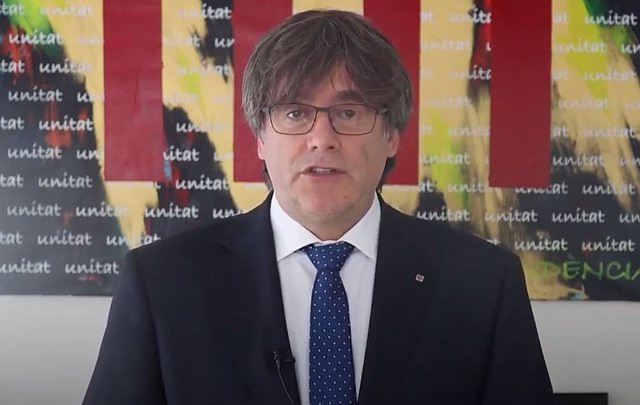MADRID, 31 Ene. (EUROPA PRESS) -
The national spokesman for the Francisco de Vitoria Judicial Association (AFJV), Jorge Fernández Vaquero, asserted this Tuesday that the decision of the Court of Justice of the European Union (CJEU), which agrees with the instructor of the 'proces', Pablo Llarena , and says that Belgium cannot refuse to hand over defendants if it does not demonstrate systemic and widespread deficiencies in Spain, opens the door for new Euro-orders to be issued from the Supreme Court. However, he qualifies that the CJEU does not close the door for Belgium to deny them.
Thus, the AJFV spokesman, in statements to Europa Press, indicated that the CJEU's decision is important because "it reinforces the European arrest warrant as an instrument of judicial cooperation between the States of the European Union". And he points out that this vehicle to claim defendants "had been somewhat damaged after the first decision of the Belgian justice."
It should be remembered that, in that decision, the Belgian judges refused to hand over former Minister Lluis Puig on the grounds that the competent court to claim his extradition should be the Superior Court of Justice of Catalonia and that, if he were handed over to Spain, rights could be put at risk such as the presumption of innocence.
From the AJFV they point out that this decision of the CJUE, now in the specific case of the former Catalan president Carles Puigdemont, we will have to wait to see what decisions are made by the Supreme Court. "Of course, the Court leaves the door open for new orders to be issued by the Spanish authorities, but it does not close it so that they can be denied by the Belgian authorities or whatever country," they explain.
In this sense, Fernández Vaquero has pointed out that from Belgium "other reasons for refusal could always be alleged other than the one that was alleged on this first occasion". Although he has qualified that the CJEU even "leaves open the door for a hypothetical lack of competence of the Supreme Court to give rise to the refusal, as long as it is a manifest lack of competence and, furthermore, in the context of a systematic violation of fundamental rights by the Spanish authorities, which would be the only case in which this reason would allow the order to be denied".
The CJEU has resolved that the Belgian Justice cannot reject the handover of those accused by the 'Procés' claimed to be tried in Spain, among them the former Catalan president Carles Puigdemont, based on the risk that their fundamental rights will be violated if they do not prove systemic and widespread deficiencies in Spain, nor can it question the powers of the Supreme Court as the authority to issue such Euro-orders.
The sentence handed down by the Grand Chamber of the European Court, before which there is no appeal and is mandatory, responds to the questions referred by Llarena in March 2021 after the Belgian Justice refused to hand over the former minister Lluis Puig on the grounds that the competent court to request his extradition was not the Supreme Court.
Llarena went to the European Justice to clarify both the scope of the issuance of the European Arrest and Surrender Orders (OEDE) issued by the Supreme Court against several defendants for their role in the 'Procés', including the former president of the Generalitat Carles Puigdemont, such as the reasons for denying the execution of such Euro-orders.

 Exploring Cardano: Inner Workings and Advantages of this Cryptocurrency
Exploring Cardano: Inner Workings and Advantages of this Cryptocurrency Seville.- Economy.- Innova.- STSA inaugurates its new painting and sealing hangar in San Pablo, for 18 million
Seville.- Economy.- Innova.- STSA inaugurates its new painting and sealing hangar in San Pablo, for 18 million Innova.- More than 300 volunteers join the Andalucía Compromiso Digital network in one month to facilitate access to ICT
Innova.- More than 300 volunteers join the Andalucía Compromiso Digital network in one month to facilitate access to ICT Innova.-AMP.- Ayesa acquires 51% of Sadiel, which will create new technological engineering products and expand markets
Innova.-AMP.- Ayesa acquires 51% of Sadiel, which will create new technological engineering products and expand markets STATEMENT: ELFBAR and LOST MARY reveal progress in the fight against illicit vapers (1)
STATEMENT: ELFBAR and LOST MARY reveal progress in the fight against illicit vapers (1) STATEMENT: ELFBAR and LOST MARY reveal progress in the fight against illicit vapers (2)
STATEMENT: ELFBAR and LOST MARY reveal progress in the fight against illicit vapers (2) The PSOE is holding a Federal Committee this Saturday that will serve to close ranks with Sánchez so that he does not resign
The PSOE is holding a Federal Committee this Saturday that will serve to close ranks with Sánchez so that he does not resign The Ibex 35 closes the week at its highest since 2015 and is already looking at 11,200
The Ibex 35 closes the week at its highest since 2015 and is already looking at 11,200 How Blockchain in being used to shape the future
How Blockchain in being used to shape the future Not just BTC and ETH: Here Are Some More Interesting Coins Worth Focusing on
Not just BTC and ETH: Here Are Some More Interesting Coins Worth Focusing on UPV students build a prototype of a wooden house to move to Equatorial Guinea
UPV students build a prototype of a wooden house to move to Equatorial Guinea The UA opens the call for the Impulso 2024 Awards for the best innovative business initiatives
The UA opens the call for the Impulso 2024 Awards for the best innovative business initiatives ALI, virtual assistant from Alicante, internationally recognized by the OECD
ALI, virtual assistant from Alicante, internationally recognized by the OECD Retrópolis brings the golden age of video games and computing to the UPV
Retrópolis brings the golden age of video games and computing to the UPV A million people demonstrate in France against Macron's pension reform
A million people demonstrate in France against Macron's pension reform Russia launches several missiles against "critical infrastructure" in the city of Zaporizhia
Russia launches several missiles against "critical infrastructure" in the city of Zaporizhia A "procession" remembers the dead of the Calabria shipwreck as bodies continue to wash up on the shore
A "procession" remembers the dead of the Calabria shipwreck as bodies continue to wash up on the shore Prison sentences handed down for three prominent Hong Kong pro-democracy activists
Prison sentences handed down for three prominent Hong Kong pro-democracy activists ETH continues to leave trading platforms, Ethereum balance on exchanges lowest in 3 years
ETH continues to leave trading platforms, Ethereum balance on exchanges lowest in 3 years Investors invest $450 million in Consensys, Ethereum incubator now valued at $7 billion
Investors invest $450 million in Consensys, Ethereum incubator now valued at $7 billion Alchemy Integrates Ethereum L2 Product Starknet to Enhance Web3 Scalability at a Price 100x Lower Than L1 Fees
Alchemy Integrates Ethereum L2 Product Starknet to Enhance Web3 Scalability at a Price 100x Lower Than L1 Fees Mining Report: Bitcoin's Electricity Consumption Declines by 25% in Q1 2022
Mining Report: Bitcoin's Electricity Consumption Declines by 25% in Q1 2022 Oil-to-Bitcoin Mining Firm Crusoe Energy Systems Raised $505 Million
Oil-to-Bitcoin Mining Firm Crusoe Energy Systems Raised $505 Million Microbt reveals the latest Bitcoin mining rigs -- Machines produce up to 126 TH/s with custom 5nm chip design
Microbt reveals the latest Bitcoin mining rigs -- Machines produce up to 126 TH/s with custom 5nm chip design Bitcoin's Mining Difficulty Hits a Lifetime High, With More Than 90% of BTC Supply Issued
Bitcoin's Mining Difficulty Hits a Lifetime High, With More Than 90% of BTC Supply Issued The Biggest Movers are Near, EOS, and RUNE during Friday's Selloff
The Biggest Movers are Near, EOS, and RUNE during Friday's Selloff Global Markets Spooked by a Hawkish Fed and Covid, Stocks and Crypto Gain After Musk Buys Twitter
Global Markets Spooked by a Hawkish Fed and Covid, Stocks and Crypto Gain After Musk Buys Twitter Bitso to offset carbon emissions from the Trading Platform's ERC20, ETH, and BTC Transactions
Bitso to offset carbon emissions from the Trading Platform's ERC20, ETH, and BTC Transactions Draftkings Announces 2022 College Hoops NFT Selection for March Madness
Draftkings Announces 2022 College Hoops NFT Selection for March Madness



























